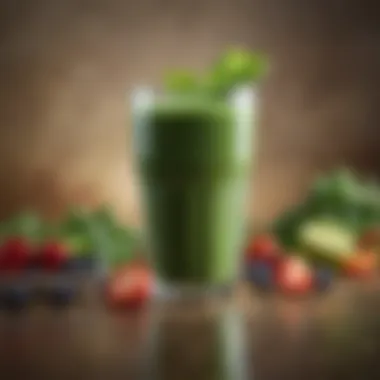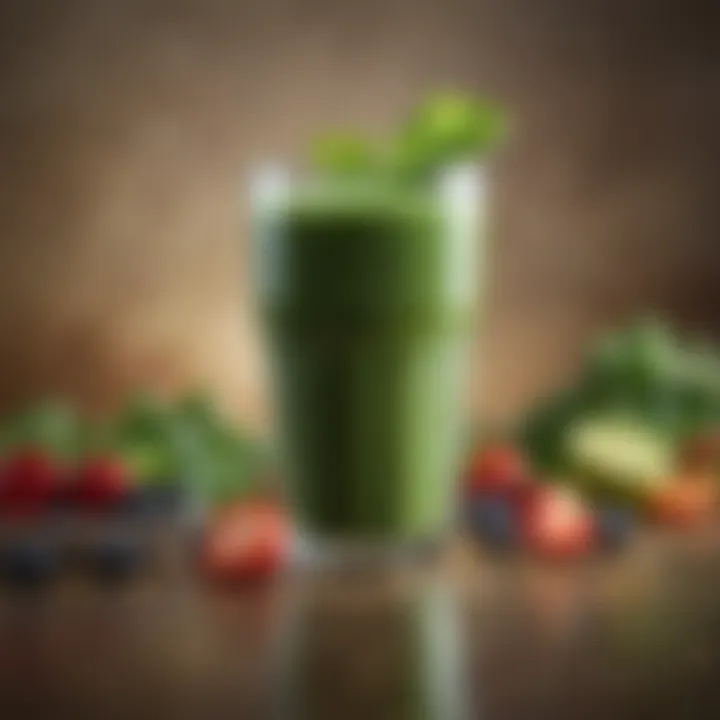Discover Energizing Caffeine-Free Beverages


Intro
Recipe Overview
Brief Summary of the Recipe
This section introduces some energizing beverages made with natural ingredients free from caffeine. The focus will be on herbal teas, smoothies, and unique infusions that provide energy through vitamins, minerals, and adaptogens. Each recipe is designed to be simple to prepare, making it accessible even for those with busy lifestyles.
Key Ingredients and Tools Needed
The following elements are essential for creating these energizing beverages:
- Herbs and Spices: Ginger, turmeric, hibiscus, and mint are popular choices that not only enhance flavor but also offer health benefits.
- Fruits and Vegetables: Berries, bananas, and leafy greens add nutrition and natural sweetness to smoothies.
- Liquids: Water, coconut water, almond milk, and herbal teas serve as the base for most beverages.
- Tools: A blender, fine mesh strainer, and measuring cups are necessary for preparation.
In summary, this overview sets the stage for a delightful exploration of energizing, caffeine-free beverages. The recipes provided will be easy to follow and include detailed instructions to ensure successful preparation.
Prelude
In today's fast-paced world, the quest for sustained energy without reliance on caffeine is increasingly relevant. Many people seek alternative sources of energy in order to avoid the jittery effects and potential crashes often associated with traditional caffeinated beverages. This article provides a thorough exploration of options that nourish both body and mind.
Energy needs are complex and varied, relating not only to physical activities but also to cognitive demands. Understanding these needs is crucial as it informs choices for energizing beverages. Potential benefits include improved concentration and overall well-being.
The alternatives discussed herein are diverse—ranging from herbal teas and fruit juices to smoothies and nut-based beverages. Each option presents unique characteristics, flavor profiles, and preparation methods. As awareness grows about dietary practices and health impacts, exploring caffeine-free options becomes essential for many individuals seeking a balanced lifestyle.
By addressing various ingredients and their properties, this article aims to empower readers to discover and experiment with energizing beverages that fit their tastes and health goals. With practical considerations and holistic insights, individuals can enhance their daily energy levels without the dependency on caffeine.
Understanding Energy Needs
Physical vs. Mental Energy
Physical energy and mental energy are interrelated but distinct aspects of our overall vitality. Physical energy refers to the stamina and strength necessary to perform activities and tasks. This can include anything from getting through a workout to completing daily chores. Factors influencing physical energy include diet, exercise, and rest. For instance, consuming whole foods rich in nutrients helps sustain energy levels throughout the day.
On the other hand, mental energy relates to alertness, focus, and cognitive function. Stress, lack of sleep, and poor nutrition can diminish mental energy. Balancing both forms of energy is critical for long-term well-being. Understanding this distinction allows one to seek specific beverages that target either physical or mental energy needs. Herbal teas, for example, may support relaxation and focus, while smoothies can provide a more holistic energy boost.
The Role of Hydration
Hydration plays a significant role in managing energy levels. Our bodies rely on water for numerous essential functions. Dehydration can lead to fatigue and decreased performance, both physically and mentally. Thus, maintaining adequate hydration is essential for optimal energy.
In the context of caffeine-free energizing beverages, exploring hydrating options can be particularly beneficial. Infused water, vegetable broths, and herbal teas are excellent ways to increase fluid intake without the stimulating effects of caffeine. Fire up your hydration game by trying drinks that combine flavor and replenishment. Good hydration paired with nutrient-dense ingredients can improve energy and enhance feelings of well-being.
Staying hydrated can be as simple as consuming flavored water or herbal infusions, which can directly influence your overall energy levels.
In summary, understanding energy needs encompasses both the differences between physical and mental energy and the crucial role of hydration. By focusing on these elements, one can better navigate the array of caffeine-free alternatives that support sustained energy throughout the day.
Herbal Teas as Energy Alternatives
Herbal teas provide a unique opportunity for those seeking caffeine-free options to enhance energy levels. They offer various benefits, often packed with natural compounds that can invigorate the mind and body without the stimulating effects commonly associated with caffeinated beverages. Understanding these attributes can help individuals make informed choices about their energy sources.
One notable aspect of herbal teas is their ability to cater to a diverse palette of flavors and health benefits. Many herbal teas contain adaptogenic herbs, which are believed to help the body adapt to stress and promote growth in energy and alertness. This characteristic sets them apart from standard teas and coffee, making them an attractive choice for people who want to avoid caffeine's jittery side effects.
Moreover, herbal teas can be consumed at any time of the day, contributing to hydration and overall wellness. Hydration plays a crucial role in maintaining energy levels. When the body is well-hydrated, it functions more efficiently, which can help counteract feelings of fatigue. Herbal teas might serve not only as energizers but as a means to nurture one's overall health.
In this section, we will discuss two herbal teas known for their energy-enhancing properties: Ginseng Tea and Peppermint Tea.
Ginseng Tea
Ginseng tea is derived from the roots of the ginseng plant. Known for its medicinal properties for centuries, ginseng can contribute significantly to energy enhancement. Research indicates that ginseng may combat fatigue and boost physical performance. It is particularly valued for its ability to stimulate both mental and physical energy.
The adaptogenic qualities of ginseng can also promote better concentration and cognitive function, making it an excellent choice for students or professionals needing that extra edge during demanding tasks. Additionally, ginseng is often used to help normalize blood sugar levels, which may provide a steady release of energy over time, avoiding the crash commonly associated with sugary snacks.
Preparation of Ginseng Tea
To prepare ginseng tea, one needs:
- Dried ginseng root or Ginseng tea bags
- Water
- Optional honey or lemon for taste
- Boil the water.
- Add the ginseng root or bag to the water.
- Let it steep for 5 to 10 minutes, depending on desired strength.
- Strain and enjoy hot, or let it chill for a refreshing iced version.
Peppermint Tea
Peppermint tea offers a refreshing flavor that is quite energizing. The menthol in peppermint can help to open airways, facilitating better breathing and increasing oxygen flow throughout the body. This can enhance physical activity and overall energy levels. Additionally, peppermint's scent is known to be uplifting and can improve mental clarity and focus.
Moreover, peppermint tea is often used to aid digestive health. A healthy digestive system supports optimal nutrient absorption, further contributing to one's general energy levels. Unlike caffeinated drinks, peppermint tea can aid in relaxation while still providing a mild energy boost.
Preparation of Peppermint Tea
For peppermint tea, gather:
- Fresh peppermint leaves or Peppermint tea bags
- Water
- Optional sweetener
- Bring the water to a boil.
- Add the mint leaves or tea bag to the water.
- Let it steep for 5 minutes.
- Strain and add sweetener if desired.
Herbal teas can serve as excellent substitutes for caffeinated beverages, promoting energy without the adverse side effects commonly felt with caffeine consumption.


Fruit Juices for Natural Energy
Fruit juices play a significant role in providing natural energy, making them an essential topic in this article. They are not only refreshing but also packed with vitamins, minerals, and antioxidants that can enhance physical and mental vigor. When considering energy-boosting options, fruit juices often stand out due to their natural sugars, which can be quickly metabolized by the body. This ability to deliver energy swiftly makes them ideal for those seeking a quick pick-me-up without the jitters associated with caffeine.
Benefits of Fruit Juices
- Natural Sugars: Fruit juices contain fructose, a natural sugar that helps to energize the body. Unlike processed sugars, fructose releases energy more steadily and can prevent energy crashes.
- Hydration: Since juices have high water content, they help keep you hydrated. Hydration is key to maintaining energy levels, especially during physical activities.
- Nutrient-Rich: Many fruit juices provide essential vitamins, including vitamin C and various B vitamins, which are important for energy metabolism.
When selecting fruit juices, it is advisable to choose those without added sugars and preservatives to maximize their health benefits. Freshly squeezed or cold-pressed juices often retain more nutrients than those that are bottled and processed.
Citrus Juices
Citrus juices, such as orange and grapefruit, are among the most effective choices for a natural energy lift. These juices are celebrated for their vibrant taste and refreshing qualities. They are rich in vitamin C, which can enhance immune function and combat fatigue. Citrus fruits contain flavonoids, which can improve blood circulation and help increase oxygen delivery to cells, further supporting energy levels.
In addition to vitamins, citrus juices offer hydration and can support digestive health due to their acidity. To prepare fresh citrus juice, simply:
- Squeeze the juice from the fruit using a manual or electric juicer.
- Optionally, strain the juice for a smoother texture.
- Enjoy it fresh for the best flavor and nutrient retention.
Beet Juice
Beet juice stands out for its unique properties that aid in enhancing physical performance. Beets are high in nitrates, which can improve blood flow and lower blood pressure. This effect can lead to improved stamina and energy while exercising. Beet juice has been shown to increase endurance in athletes, making it popular among fitness enthusiasts.
Moreover, beet juice contains antioxidants, which help combat oxidative stress in the body. This can contribute to overall well-being and is particularly beneficial after intense physical exertion.
To prepare beet juice, follow these steps:
- Wash the beets thoroughly and scrub away any dirt.
- Cut off the tops and bottoms and slice the beets into smaller pieces.
- Feed them into a juicer or blender, adding a bit of water if needed, to help with blending.
- Strain if necessary and serve chilled for the best results.
"Natural fruit juices serve as a wholesome alternative to caffeinated drinks, offering sustained energy and hydration without the side effects."
In summary, fruit juices such as citrus and beet juice are excellent complements to a caffeine-free energy-boosting regimen. They provide essential nutrients, hydration, and natural sugars that can enhance performance and overall vitality. Incorporating them into your daily routine can help maintain consistent energy levels throughout the day.
Smoothies and Energy Boosting Smoothie Recipes
Smoothies represent a versatile and nutritious alternative when looking for caffeine-free energy boosters. They combine various ingredients, allowing for creativity while tailoring to individual tastes. Smoothies are often balanced with fruits, vegetables, and proteins offering a quick way to pack in nutrients. Their ease of preparation makes them accessible, as one can blend different items at home or purchase them on the go. This article highlights the benefits of smoothies, emphasizing their potential to deliver sustaining energy, facilitate digestion, and support overall well-being.
Green Smoothies
Green smoothies have gained popularity due to their health benefits and vibrant color. These smoothies generally consist of leafy greens such as spinach or kale, which are loaded with vitamins and minerals. Adding fruits like bananas or apples not only enhances taste but also adds natural sweetness.
Some advantages of green smoothies include:
- Rich in Nutrients: Leafy greens provide essential vitamins and antioxidants.
- Fiber Content: Ingredients high in fiber aid digestion and keep you feeling fuller longer.
- Hydration: Many recipes incorporate water or coconut water, fostering hydration.
To prepare a green smoothie, blend:
- 1 cup of spinach
- 1 banana
- 1/2 cup of almond milk
- Optional: A teaspoon of honey or a tablespoon of flaxseeds for added flavor and nutrition.
"Green smoothies can be an excellent way to start the day or recharge after a workout."
Protein-Packed Smoothies
Protein-packed smoothies cater well to those looking to increase their protein intake without caffeine. They are beneficial for muscle recovery and can help maintain energy levels throughout the day. Common sources of protein in smoothies include Greek yogurt, nut butter, or added protein powder.
Here are notable points regarding protein-packed smoothies:
- Support Muscle Repair: The protein helps in recovery, especially after exercise.
- Sustained Energy: They release energy more slowly, keeping you energized longer.
- Customizable: You can easily adjust protein levels based on personal health goals.
A simple protein-packed smoothie can include:
- 1 cup of Greek yogurt
- 1 tablespoon of almond butter
- 1/2 cup of frozen berries
- Optional: A scoop of vanilla protein powder for an extra boost.
Using smoothies as an energy source provides numerous opportunities to include various ingredients. By blending fruits, vegetables, and healthy fats or proteins, you can create energizing drinks without caffeine. Each sip can cater to your taste preferences and nutritional needs.
Nut and Seed-Based Beverages
Nut and seed-based beverages are gaining attention as viable alternatives for those seeking energy without caffeine. These drinks not only provide a natural energy boost but also have numerous health benefits. They are rich in nutrients, can calm hunger, and promote overall wellness. This section will discuss two popular options: almond milk and chia seed drinks, exploring their compositions, benefits, and preparation.
Almond Milk
Almond milk has become a staple in many households, especially among those looking for dairy-free alternatives. It is created by blending soaked almonds with water, followed by straining the mixture. The result is a creamy beverage that is lower in calories compared to cow's milk.
Almond milk contains healthy fats, vitamins, and minerals. It is particularly high in vitamin E, which is an antioxidant that can help combat oxidative stress in the body. Furthermore, it is a good source of magnesium, crucial for energy production.
Here are some notable benefits of almond milk:
- Low-Calorie Option: Suitable for weight management.
- Hydration: Helps maintain hydration, contributing to overall energy.
- Versatility: Can be used in smoothies, coffee drinks, or enjoyed on its own.
Considerations when consuming almond milk include potential additives such as sugars and preservatives in store-bought options. Choosing unsweetened versions can help in avoiding excess calories while maximizing health benefits. For those who prefer homemade almond milk, the process is straightforward and allows control over the ingredients
Chia Seed Drinks
Chia seed drinks are another excellent energy alternative. Chia seeds are tiny but packed with nutrients. When soaked in liquid, these seeds expand and create a gel-like texture, making the drink enjoyable and filling.


These seeds are an extraordinary source of omega-3 fatty acids, fiber, protein, and various essential minerals. Omega-3s are known to support heart health and cognitive function, while fiber aids in digestion and keeps you feeling full longer, thus regulating energy levels throughout the day.
The preparation of a basic chia seed drink is simple:
- Add 1-2 tablespoons of chia seeds to a glass of water or fruit juice.
- Let it sit for about 10-15 minutes to allow the seeds to absorb the liquid and swell.
- Optionally, add sweeteners, fruits, or spices for additional flavor.
Key benefits include:
- Energy Sustenance: Provides a slow release of energy, preventing crashes.
- Nutrient Trifecta: Offers protein, fat, and carbohydrates in one drink.
- Easily Digestible: Perfect for people with dietary restrictions or those seeking nutrient-dense options.
In summary, nut and seed-based beverages like almond milk and chia seed drinks are practical choices for increasing energy while avoiding caffeine. Their nutrient profiles provide essential health benefits, catering to a variety of dietary preferences.
Vegetable Broths and Soups
In the realm of caffeine-free energizing beverages, vegetable broths and soups present a unique and wholesome option. They provide a variety of nutrients while also delivering hydration, which is essential for maintaining energy levels. The warmth of a good broth or soup can soothe both body and mind, making it a comforting choice for many. When you are looking for something to lift your spirits and provide that slight boost in energy, these options are worth considering. Moreover, they can be easily customized to fit personal preferences and nutritional needs.
Benefits of Vegetable Broth
Vegetable broth is more than just a base for soups; it offers numerous benefits. Firstly, it is low in calories, making it an excellent choice for those watching their weight. Its high water content aids in hydration, which is vital for optimal energy levels. Hydration can sometimes be overlooked, yet it's a crucial element in combating fatigue.
Beyond hydration, vegetable broth is rich in vitamins and minerals. Ingredients like carrots, celery, and herbs infuse the broth with essential nutrients that can enhance overall wellness. Antioxidants present in these vegetables help reduce inflammation and support the immune system, contributing to better vitality.
"A well-crafted vegetable broth can serve not just as a nourishing drink, but also as a tool for overall energy management and enhancement."
Additionally, vegetable broth is an ideal platform for introducing more complex flavors through herbs and spices. This variety can get your palate excited and lead to a satisfying consumption experience. When made fresh, maximized nutrition becomes a key benefit. You control what goes in, ensuring no artificial additives or excessive sodium.
Creative Soup Recipes
Creating soups can be as simple or as intricate as desired. Here are some creative recipes you can try to elevate both taste and energy.
- Miso Vegetable Soup
Miso paste adds depth of flavor while providing probiotics to support gut health. Combine miso with shiitake mushrooms, bok choy, and green onions, simmering to create a hearty soup. - Roasted Tomato Basil Soup
Roast ripe tomatoes with garlic and onion before blending them with fresh basil for a vibrant, refreshing soup. This version allows you to enjoy rich flavors while keeping calories in check. - Coconut Curry Lentil Soup
Combine coconut milk, lentils, and your favorite curry spices. This dish not only offers a fulfilling meal but also imparts energy through protein and fiber-rich lentils. - Spicy Ginger Carrot Soup
Blend ginger with carrots, vegetable stock, and a touch of cayenne pepper for warmth. This soup can stimulate the senses and provide a refreshing experience.
Using fresh and seasonal ingredients maximizes the health benefits. Experimenting with herbs, spices, and vegetables of your choice can create unique combinations that suit your taste. With vegetable broths and soups, you not only satisfy hunger but also support your energy needs in a healthy manner.
Infused Water Options
Infused water presents a brilliant alternative to sugary drinks and caffeinated beverages. This section emphasizes the health benefits and the ease of preparation that infused water offers. Incorporating herbs, fruits, and vegetables provides nourishment without excessive calories. Infused water can enhance hydration, a crucial element for maintaining energy levels throughout the day. It is essential to consider how flavors meld and impact the overall experience, creating a refreshing option for those wanting to stay energized without caffeine.
Herbal Infusions
Herbal infusions are an exciting way to elevate water's taste. Infusing water with herbs not only adds flavor but also delivers various health benefits. Simple herbs such as mint, basil, and rosemary provide a refreshing twist, making hydration more enjoyable.
- Mint is known for its digestive support, which can promote overall wellness.
- Basil possesses anti-inflammatory properties, ideal for overall health improvement.
- Rosemary enhances cognitive function, supporting better focus.
To create a herbal infusion, add a handful of fresh herbs to a pitcher of water and let it steep in the refrigerator for a few hours. This will allow the water to absorb the herbal flavors fully and make it a delightful beverage. Herbal-infused waters can be served cold or at room temperature, depending on personal preference.
Fruit-Infused Water
Fruit-infused water combines the natural sweetness of fruits with the clarity of water. This option not only invigorates the senses but also adds nutrients beneficial for energy sustenance. Using fruits like citrus, berries, or cucumbers enhances the hydration experience.
- Citrus fruits such as lemons and limes provide a vibrant flavor and high levels of vitamin C.
- Berries like strawberries, blueberries, and raspberries are rich in antioxidants.
- Cucumber adds a refreshing cooling effect, making it ideal for warm days.
To make fruit-infused water, slice fruits and place them in a pitcher of water. The infusion process can take anywhere from 30 minutes to overnight for optimal taste. The longer the fruits steep, the more flavorful the water will become. Enjoying fruit-infused water helps maintain hydration levels while offering a natural way to boost energy.
"Infused water not only keeps you hydrated, but it also makes every sip more exciting and flavorful."
Overall, these infused water options illustrate a simple yet effective way to enhance energy levels and well-being, while being mindful of calorie intake.
Exploring Nutritious Powders
Nutritious powders are becoming increasingly popular as an easy and impactful way to boost energy levels. We are seeing more people turn to these powders due to their convenience and versatility. They can be easily added to smoothies, shakes, or even baked goods, which makes them appealing for various diets and preferences.
These powders are often nutrient-dense, providing essential vitamins, minerals, and sometimes even protein. Including them into the diet can offer a range of health benefits. For instance, many of these powders aid in energizing without the jitters commonly associated with caffeine.
When exploring nutritious powders, it is important to consider the sources and their production methods. Different powders may also have varying impacts on individuals, so finding the right one may require some experimentation.
"Nutritious powders can dramatically enhance energy levels and overall well-being."
Maca Powder
Maca powder is derived from the root of the maca plant, which is native to the Andes region of Peru. It has gained popularity for its reputation as a superfood. One of the primary reasons people turn to maca is its potential to improve stamina and energy levels. It is rich in vitamins B, C, and E, along with essential minerals such as calcium, potassium, and iron.
The taste of maca powder is somewhat nutty and earthy, making it a great addition to smoothies or oatmeal. Apart from energy benefits, maca may also have positive effects on mood and hormonal balance. However, while maca can enhance energy, it's best to consume it in moderation. Starting with small doses can help gauge how your body reacts to it.
Spirulina
Spirulina is a blue-green algae that is packed with nutrients. Often hailed as a superfood, it contains high levels of protein, vitamins, and minerals. This nutritional powerhouse is known for its potential to enhance physical performance and combat fatigue. Spirulina is rich in antioxidant properties and can help support the immune system.
Adding spirulina to your diet could also contribute to detoxification, as it aids in the elimination of heavy metals from the body. It has a unique, mild flavor that pairs well with various dishes, especially in smoothies or energy bars. The vibrant green color it adds is a visual bonus, but one should be mindful of quality when purchasing spirulina. Some products may be mixed with fillers or lower quality ingredients, which can undermine its benefits.
Incorporating nutritious powders like maca and spirulina can be a comprehensive approach to supporting energy levels naturally. Each offers distinct benefits, and they can easily fit into a balanced diet.
The Role of Adaptogens


The growing interest in health and wellness has brought adaptogens into the spotlight. These substances, often derived from plants and mushrooms, have unique properties that can enhance the body's resistance to stress or fatigue. In the realm of caffeine-free energy sources, adaptogens prove to be crucial. They offer an alternative approach to manage energy without triggering the negative effects commonly associated with caffeine.
Adaptogens are viewed as beneficial in several ways. First, they help improve the body’s ability to cope with stress. This is vital since stress can deplete energy levels and lead to fatigue. Furthermore, adaptogens can support mental clarity and focus, qualities essential for both physical and mental tasks. They promote balance, enhancing resilience in both mind and body. For individuals looking for a natural approach to boost energy, the importance of adaptogens cannot be overstated.
What are Adaptogens?
Adaptogens are non-toxic plants that are believed to help the body adapt to stressors. These plants have a long history of use in traditional medicine, particularly in Asian and herbal traditions. The primary mechanism of adaptogens lies in their ability to regulate the hypothalamic-pituitary-adrenal (HPA) axis. This regulation leads to improved energy metabolism and enhanced regulatory function in the body.
Some common examples of adaptogens include ginseng, ashwagandha, and rhodiola rosea. Each of these adaptogens has unique benefits, providing various ways to support energy levels. By incorporating adaptogens into the diet, individuals may experience improved vitality and reduced fatigue, making them an excellent choice for those seeking caffeine-free energy alternatives.
Popular Adaptogenic Drinks
There are numerous adaptogenic beverages that can easily be integrated into daily routines. These drinks not only provide an energy boost but also promote overall wellness. Some notable options include:
- Ashwagandha Latte: Made with ashwagandha powder, milk (or a milk alternative), and spices. This drink can promote calmness and relaxation.
- Mushroom Coffee: Blends various mushrooms such as lion's mane and chaga with coffee substitutes. It helps to enhance cognitive function and support the immune system without the jitters of conventional coffee.
- Holy Basil Tea: Also known as Tulsi, this tea can reduce stress and promote a sense of tranquility while providing a gentle energy boost.
- Rhodiola Infusion: Combining rhodiola extract with hot water can create a simple tea that supports mental and physical endurance.
Incorporating adaptogenic drinks into the daily diet can provide sustained energy and promote a sense of well-being. Each drink serves not only to enhance energy levels but also to support overall health, aligning perfectly with the goals of those exploring caffeine-free alternatives.
"Adaptogens are not just trendy herbs; they are ancient remedies that have stood the test of time when it comes to enhancing vitality and well-being."
Caffeine Alternatives for Energy
The search for energy sources is a constant endeavor for many individuals. Caffeine, often a go-to stimulant for a quick boost, comes with its own set of challenges and side effects, such as jitters and crashes. Therefore, exploring alternative sources of energy becomes essential. The goal here is to highlight how these alternatives can provide sustained energy levels without the downsides of caffeine.
Caffeine alternatives often rely on natural ingredients, which can help energize the body and mind. Benefits of using these alternatives include:
- Reduced Anxiety: Many people experience anxiety as a side effect of caffeine. Non-caffeinated alternatives tend to promote a calmer state, which leads to more effective energy management.
- Nutritional Value: Many of these alternatives come with added health benefits, such as vitamins, minerals, and antioxidants. For instance, herbal teas and juices can enrich the body with necessary nutrients.
- Sustainable Energy: Unlike caffeine, which can lead to spikes and crashes in energy, alternatives like guarana and yerba mate can provide a more gradual and sustainable energy boost.
Incorporating these substitutes into one’s diet can drastically improve overall energy and focus without relying on caffeine. Below are two prominent sources that exemplify the benefits of caffeine alternatives.
Guarana
Guarana is a tropical plant native to the Amazon. Its seeds contain about twice the amount of caffeine found in coffee beans. However, guarana suggests a unique advantage due to its composition. Although it contains caffeine, it also includes other beneficial compounds that promote alertness and focus.
The benefits of guarana are numerous:
- Enhanced Mental Performance: Studies indicate that guarana enhances cognitive performance, including memory and attention span.
- Increase in Energy Levels: It is commonly used in energy drinks. Guarana extracts can elevate energy by enhancing metabolic activity.
- Weight Management Property: Guarana is often included in weight loss supplements as it may increase fat oxidation, making it a popular choice for fitness enthusiasts.
In addition to these benefits, guarana is often available in various forms, including powders, extracts, and capsules, making it easy to incorporate into daily routines.
Yerba Mate
Yerba mate is a traditional South American drink made from the leaves of the Ilex paraguariensis plant. Often lauded for its unique blend of energy-boosting properties, it remains a popular choice in countries like Argentina and Brazil.
Key features of yerba mate include:
- Balanced Energy Boost: Unlike caffeine, yerba mate provides a balanced energy boost, alleviating the likelihood of crashes. Many users report consistent energy levels.
- Rich in Antioxidants: This drink is loaded with antioxidants that promote overall health. It can help combat oxidative stress and reduce inflammation in the body.
- Social Experience: Consuming yerba mate often involves a communal aspect, as it is traditionally shared among friends. This does not only enhance social interactions but also reinforces community ties.
Yerba mate can be enjoyed in various ways, including traditional gourd preparation or modern bottled options. As seen, both guarana and yerba mate stand out as substantial caffeine alternatives, offering numerous benefits that cater to those seeking energy without the drawbacks of traditional caffeine.
Lifestyle Choices and Energy Management
Dietary Considerations
Diet plays a crucial role in energy management. The foods you consume provide the building blocks for your body’s energy production. Prioritizing whole foods over processed options can lead to sustained energy levels throughout the day.
Focus on incorporating a variety of fruits, vegetables, whole grains, and lean proteins into your meals. These nutrients support metabolic functions and contribute to overall well-being. For instance, complex carbohydrates found in oats or brown rice release energy more steadily than refined sugars, avoiding energy spikes and crashes.
Hydration is another essential factor. Even mild dehydration can lead to fatigue. Drinking adequate amounts of water and including water-rich foods, like cucumbers and oranges, can help keep energy levels optimal.
Consider keeping a food diary to identify which foods boost your energy and which might lead to feelings of sluggishness. This can help tailor your diet to suit your personal needs better and improve your lifestyle.
Exercise and Energy Levels
Physical activity has a direct impact on energy management. Regular exercise can enhance cardiovascular health, improve muscle strength, and boost endurance. These benefits translate to better overall energy levels and a more vibrant life.
Engaging in at least 150 minutes of moderate-intensity exercise each week is recommended. Activities can include walking, swimming, cycling, or even yoga. Finding a routine that you enjoy increases the likelihood of staying active over time.
Moreover, exercise helps reduce stress and anxiety. This can further improve your energy levels as mental health directly correlates with physical wellness. As a bonus, the endorphins released during exercise can boost your mood.
"Regular exercise is not only beneficial for physical health but also essential for maintaining high energy levels and enhancing mental clarity."
Incorporating movement throughout the day is also vital. Short, frequent breaks to stretch or walk can fight fatigue. Standing desks or taking the stairs can contribute positively to energy levels. Overall, balancing diet and exercise is key to effective energy management.
End
The exploration of caffeine-free energizing beverages underscores a vital shift in how we regard energy sources. The significance of this topic lies in its potential to provide alternatives that cater not just to tastes, but also to health-conscious choices. Many individuals are seeking ways to enhance their energy levels while avoiding the jitters and crashes often associated with caffeine.
Caffeine-dependent energy sources can lead to a cycle of dependence and withdrawal. By considering the numerous options available, from herbal teas like ginseng and peppermint to nutrient-dense smoothies, one can achieve sustained energy without the pitfalls of caffeine. Each beverage presents unique benefits. For instance, ginseng tea is known for its potential to boost overall vitality, while smoothies, especially those packed with protein, can be tailored to specific nutritional needs.
Incorporating a variety of these beverages into daily routines can promote better hydration, improved mental clarity, and overall well-being. It is essential to be mindful about ingredient choices. Ingredients such as maca powder and spirulina not only contribute to energy but also provide essential nutrients, aligning with dietary preferences and restrictions.
Furthermore, the discussion around energy management expands beyond beverages. Lifestyle choices, including diet and exercise, play a significant role. A balanced approach encompassing wholesome nutrition and regular physical activity can create a foundation for energy enhancement that aligns with an individual’s lifestyle.
In this article, we've dissected various energizing options, emphasizing their preparation and benefits. As more people opt for a caffeine-free lifestyle, understanding these alternatives becomes crucial for maintaining energy levels and promoting long-term health. This comprehensive guide serves as a resource for those keen on making informed choices in the realm of caffeine-free energy.
"Exploring these alternatives can enhance well-being significantly while allowing for personal taste preferences."
Exploring caffeine-free beverages is not just about the drinks themselves; it is about rethinking our approach to energy and well-being.







